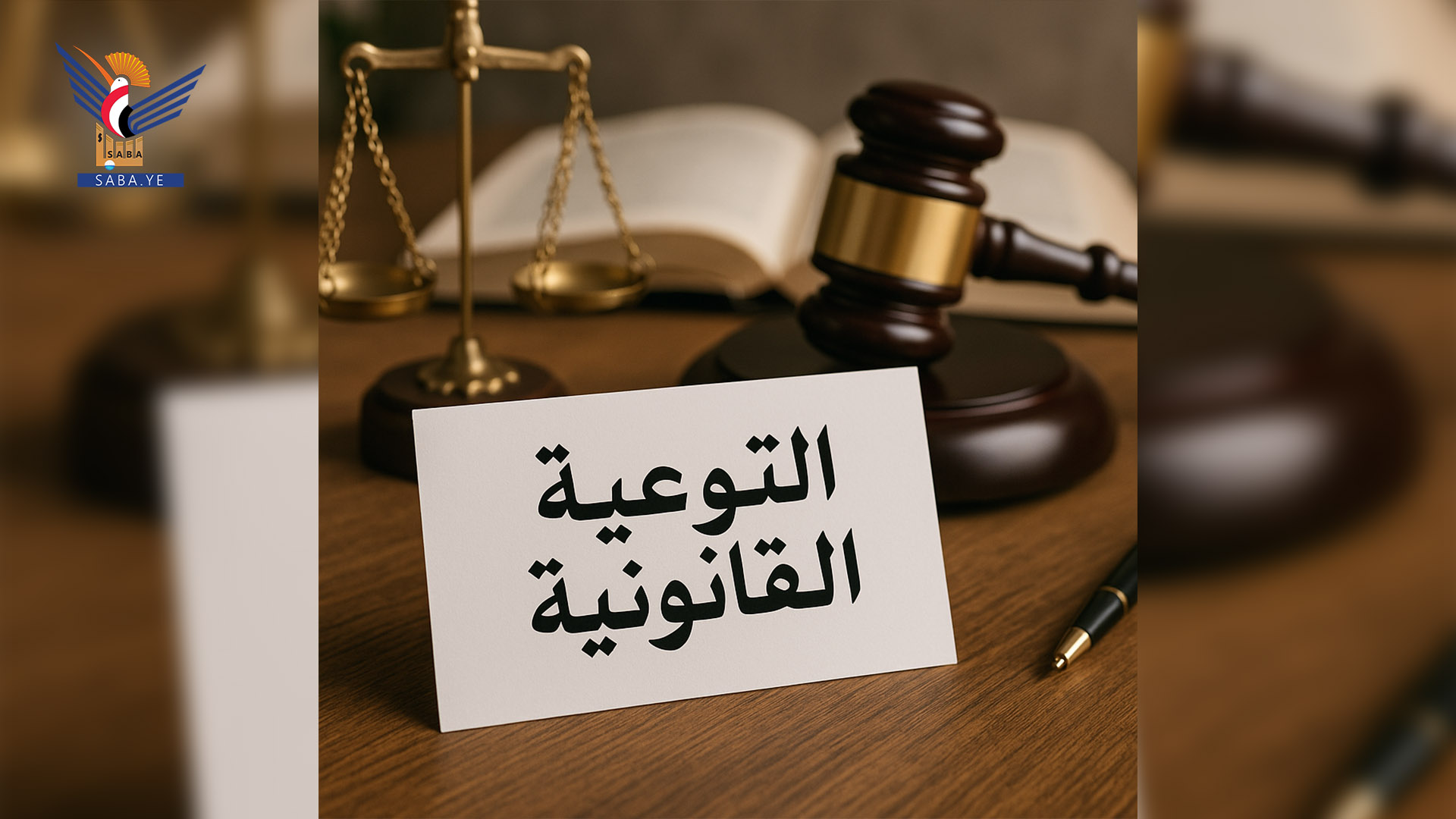
San‘a – Saba – By: Yahya Jaber
Ignorance of the law causes major social and economic problems for individuals and communities, placing heavy burdens on various state institutions—especially those responsible for security, justice, development, and the economy, particularly in cases of property disputes and criminal incidents.
To address this, legal awareness must be prioritized, and a large part of this responsibility lies with national media. However, the media is sometimes itself uninformed—it may highlight only the problems without addressing solutions, such as educating people about the legal procedures that protect citizens from falling prey to swindlers, criminals, and organized gangs during transactions.
Studies indicate that delays in adjudicating such cases can result in severe financial losses for individuals. People may lose all their money to lawyers while seeking justice. Socially, they might abandon education or jobs to follow up their cases, costing the country productive minds and talents it could have benefited from.
According to sociologists, this also contributes to rising crime rates, which deter investors, cause capital flight, and harm sectors like trade and tourism due to insecurity. It also erodes social cohesion, as crimes like land grabbing spread fear and distrust among the population. Such crimes may trigger a culture of revenge or self-administered justice, instead of legal solutions. Furthermore, these gangs may be exploited politically, used by powerful actors for intimidation or pressure, thereby deepening corruption and complicating the security and political landscape.
This report highlights how legal knowledge can serve as a shield, based on insights from legal experts and lawyers. Through a survey of the most common cases raised to the leader of the revolution, the head of the Supreme Political Council, and the courts, it was found that 80% of the cases concern private property disputes, followed by criminal cases.
Legal experts stress that citizens should understand the importance and types of contracts, as this is essential to avoid legal problems related to proof of ownership. Contract types include:
- Valid contract: meets all legal and consensual conditions (capacity, consent, object, cause, and form in some cases).
- Void contract: lacks essential elements such as legal capacity, consent, or legality of the object.
- Voidable contract: can be annulled at the request of one party (e.g., due to coercion, fraud, or being a minor).
- Effective vs. ineffective contracts: an effective contract takes legal effect upon signing, while an ineffective one requires additional actions (e.g., third-party approval).
- Binding vs. non-binding contracts: Binding contracts obligate one or both parties to perform duties, whereas in non-binding ones, a party may withdraw without legal consequences.
There are five essential elements of a contract:
- Offer and acceptance
- Subject matter (must be legal, specific, and possible)
- Cause
- Legal capacity (must be of sound mind, of age, and not legally prohibited from contracting)
- Consent
In property disputes, legal proof includes sales contracts, ownership deeds, witness testimony, and expert evaluations. Witnesses are particularly important when documents are lacking or to clarify certain details. Forgery can be proven by handwriting experts, document analysis, or comparing original and forged copies.
Experts explain that legal experts are consulted when a case requires technical or scientific input. Rights to real estate can be proven using documents like title deeds, sale contracts, or land registry certificates.
Criminal cases rank second among social issues due to their heavy impact on the state and the legal system. These crimes are an unavoidable reality—rooted in human greed, envy, and pride—and thus test the state’s ability to investigate and respond swiftly to minimize harm. Delayed justice leads to significant consequences.
The aggression against Yemen since 2015, led by Saudi Arabia, is a prime example of crimes that require official documentation and legal pursuit for compensation. These crimes do not expire with time and remain the people’s right to demand.
Lawyers emphasize the importance of legal awareness in criminal matters, so that individuals who unexpectedly face incidents can handle them properly, ensuring their rights are protected—especially in physical assault cases and related compensations.
They pose a useful example:
When is forensic evidence used in civil cases?
When there is a link between a crime and civil liability—for example, in lawsuits for damages caused by criminal acts.
Evidence of harm in compensation cases includes medical reports, expert evaluations, witness statements, and financial documents proving monetary losses. Proper documentation increases the legal strength of evidence and reduces the risk of rejection in court.
Circumstantial evidence is used when direct proof is unavailable. It relies on logical deductions to infer whether an event occurred.
Elements of a criminal offense include:
- Physical act (commission or omission)
- Criminal intent
- Legal responsibility
A person is held criminally responsible if they committed a crime intentionally or through negligence and had control over their actions.
Intentional vs. unintentional crimes:
- Intentional: committed with full awareness and purpose.
- Unintentional: result from negligence or carelessness.
Criminal penalties may include:
- Imprisonment
- Fines
- Community service
- Probation
The severity depends on the nature and seriousness of the crime.
Determining intent involves analyzing the accused’s actions, statements, circumstances of the crime, and criminal history.
Criminal investigations include gathering evidence, interviewing witnesses and suspects, and submitting findings to the public prosecutor. Involved parties include investigators, prosecution, and defense attorneys.
Rights of the accused are protected by:
- Fair trial
- Right to legal counsel
- Protection from torture or inhumane treatment
Difference between acquittal and pardon:
- Acquittal: the accused is found not guilty.
- Pardon: the accused is guilty, but exempted from all or part of the sentence by official decree.
Conclusion:
The state must implement broad legal education campaigns across schools, universities, government offices, media outlets, and TV/radio channels. Legal awareness is key to protecting citizens from property fraud, criminal entanglement, or tribal vendettas masquerading as honor and justice.